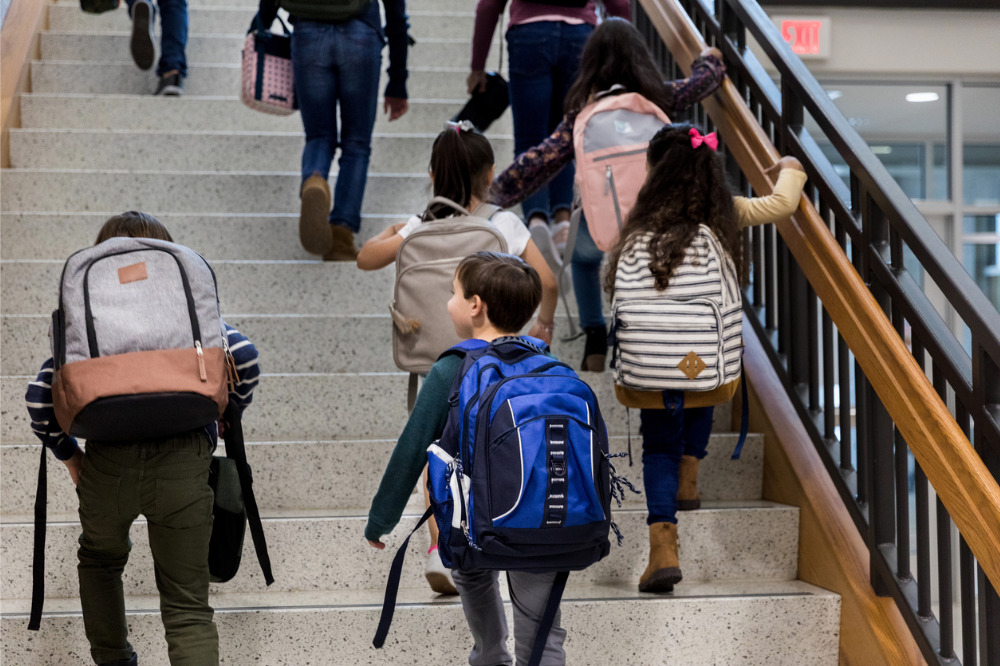
A radical new virtual learning program aims to turbocharge students’ school attendance by helping to engage young people who feel they can’t currently attend a physical school.
Studies have shown that students who refuse school and do not return to school experience poor life outcomes, including lower employment prospects, issues maintaining social relationships and mental health challenges.
However, a new Victorian-first education model – launched by St Joseph’s Flexible Learning Centre in North Melbourne after successful trials in 2022 – is tackling this issue head on by combining online individualised learning with in-person wellbeing support, delivering the curriculum through a mix of virtual live classes and assigned tasks that students can access anytime they want.
Daniel Brown, Head of the BlendED program and Assistant Principal at St Joseph’s North Melbourne, said students are allocated a dedicated youth worker who helps them overcome barriers to school refusal, and also sets them up for future success by equipping them for potential post-graduation pathways.
“We work closely with the young people to harness their interests and provide multiple opportunities for new passions to be realised. The Australian Curriculum and the VCE Vocational Major are the two curriculum offerings in the program,” Brown told The Educator.
The school, which is governed by Edmund Rice Education Australia (EREA) and caters for young people who have barriers to engaging in education, is supported by the team from its North Melbourne site to access VET options that suit individual students’ interests.
“These options include the Certificate II in Workplace Skills, micro-credentials, online units, offsite VET Delivered to Secondary Schools and School Based Apprenticeships and Traineeships. We also offer Structured Workplace Learning (SWL) placements and have strong partnerships with community organisations that help support pathways and career exploration,” Brown said.
“All the young people we work with have unique and varied educational and wellbeing needs. As educators, it is our job to remove as many barriers as possible that have prevented our young people to meaningfully engage in education.”
Power with, not power over
Chloe Hand, director EREA Flexible Learning Schools Victoria, said the organisation’s youth workers are selected based on their qualification “and equally, their demonstration of unconditional positive regard for young people”.
“We have worked alongside tertiary institutions such as RMIT, Victoria University and the Gordon Institute to identify and upskill the best candidates to ensure we have a workforce that can achieve the very best outcomes for our young people,” Hand told The Educator.
Hand said a core focus of the induction process is training the school’s team in its trauma informed approach to education, Operation By Principles – the framework the school uses for all of its interactions with young people, staff and the community.
“Operation by Principles provides an opportunity for common ground where staff can negotiate with young people, regardless of how they are presenting and work to engage them in learning. Common ground creates the working relationship of power with, not power over,” she said.
“Operation by principles is both a philosophy, and a set of skills, including de-escalation, and collaborative problem solving. These skills provide the opportunity to work through challenges with young people, circle time and working agreements.”
Hand said the organisation’s youth workers routinely arrange and lead care teams meetings with all relevant people to bring about a multidisciplinary approach to supporting the needs of the young people.
“Some of the primary services we are working with are Orygen Youth Mental Health service, Headspace, The Navigator Program, Youth Support and Advocacy Program, and Child Protection. We also consult with professional services, such as private psychologists, to provide assessments and recommendations for young people when required.”
Getting everyone on the same page
Brown said the school’s ‘student facing’ and engaging online environment captures and documents discussion through virtual Student Support Group (SSG) meetings, which helps to build rapport and trust between students and staff.
“As the Assistant Principal, it is my role to work with and support staff and students in the goal setting process. Part of my role is to create accessible documentation and processes to allow staff and students to capture and measure learning goals,” he said.
“The SSG meetings are held at set times, and as required, throughout the year with the young person and the stakeholders in their education.”
Brown said the success of the meetings is driven by clear processes of consultation and collaboration with all parties, where co-creation of educational and wellbeing goals are agreed upon.
“These documented goals are monitored and reviewed routinely throughout the year and learning growth is celebrated and measured with various data sources.”


